Annual Report (FY 2024-25)
Special Article: Post-Katrina New Orleans
Special Article: The Sahrawis
Quarter 2 (Nov 2024-Feb 2025)
Quarter 1 (Aug-Oct 2024)
April–June 2024 Newsletter










March 2024 Newsletter






ADDENDUM to March 2024 Newsletter
Martina Arroyo and Thelma Ithier Sterling: Celebrating Afro-Puerto Rican Operatic Trailblazers
Following our newsletter article on “Black Women in Opera,” it would be remiss of us not to highlight the indispensable contributions of Afro-Boricuas Martina Arroyo and Thelma Ithier Sterling. Their legacies illuminate the path for future generations in the opera world.
Arroyo carved her niche in the realm of opera from the 1960s through the 1980s, not just as a performer of remarkable talent but also as a pioneering figure of Afro-Puerto Rican descent in a predominantly white industry. Born on February 2, 1937, in New York City, Arroyo's journey from the vibrant streets of Harlem to the grand stages of the world's most prestigious opera houses is a testament to her extraordinary skill, determination, and the rich cultural heritage that shaped her.
Arroyo's early life was steeped in the diverse cultural influences of her Afro-Puerto Rican father and African-American mother. This blend of cultures was reflected in her personal identity and her approach to music, infusing her performances with a unique depth and emotion. Her father, a mechanical engineer, and her mother, a talented amateur classical pianist, provided Arroyo with a nurturing environment that celebrated her artistic interests, laying the groundwork for her future success.
Despite the barriers faced by artists of color at the time, Arroyo's formidable talent could not be overlooked. Her breakthrough came with her association with the Zurich Opera between 1963 and 1965, followed by a distinguished tenure at the Metropolitan Opera from 1965 to 1978. Arroyo's repertoire, especially her portrayal of Verdi and Puccini heroines, earned her international acclaim, and she became a symbol of breaking racial barriers in the opera world.
Arroyo's Afro-Puerto Rican identity played a crucial role in her career, not only in how she was perceived but also in how she perceived herself as an artist and a pioneer. Her performances were not just displays of vocal prowess but acts of cultural representation, showcasing her rich heritage. Arroyo's success challenged the status quo, opening doors for future generations of artists of color.
Beyond her remarkable career on stage, Arroyo dedicated much of her life post-retirement to education, teaching singing at various universities in the United States and Europe. Her commitment to nurturing young talent was a continuation of her legacy, ensuring that the path she carved remains open to those who follow.
For her part, Thelma Ithier Sterling, a Puerto Rican soprano and esteemed professor at Hostos Community College, has made significant contributions to both the realms of musical theater and concert performances. With a rich repertoire that celebrates the Spanish and Latin American musical heritage, Sterling has been a favored choice for world premieres by renowned composers like Tania León, Manuel B. González, Joaquín Nin-Culmell, and William Ortiz. Her journey in music began at the Puerto Rico Conservatory of Music under the guidance of Olga Iglesias and continued at the University of Puerto Rico. Sterling's pursuit of excellence led her to the United States, where she furthered her studies with notable teachers such as Daniel Ferro, Cynthia Hoffman, and Efrén Puig, culminating in a master’s degree from the Manhattan School of Music in New York City. Her dedication to her craft saw her participating in summer programs at Westminster Choir College, engaging in vocal workshops and master classes, and completing various post-graduate courses.
Sterling's career is marked by her involvement with the Spanish Theater Repertory Co. in New York, where she earned accolades for her solo and ensemble performances. As a soloist with the Hispanic Music female vocal quartet under Pablo Zinger's direction, she explored the depths of Spanish and Latin American vocal chamber music. Her collaborations have extended to prestigious groups like the Bronx Arts Ensemble, American Composers Orchestra, and Chamber Music North-South Consonance, showcasing her versatility across opera, oratory, chamber music, and operetta.
Sterling has worked under the baton of illustrious directors such as Paul Dunkel and Tania León, and her performances have graced stages from the Dominican Republic's National Theater to New York's iconic Carnegie Hall and the Alice Tully Hall at Lincoln Center. The daughter of Rafael Ithier, the founder of El Gran Combo de Puerto Rico, Thelma Ithier Sterling's legacy is a testament to her exceptional talent and her rich cultural heritage and dedication to the arts.
Arroyo's and Ithier Sterling’s stories powerfully remind us of the impact of cultural heritage on the arts. Their journey will remain a beacon of inspiration, demonstrating music's transformative power and cultural identity's enduring strength. Through their voices, they have illuminated the richness of Afro-Puerto Ricanness, leaving an indelible mark on the world of opera and beyond.
Learn more about Arroyo here.
Enjoy a piece performed by Ithier Sterling here.
This piece was originally published via Mailchimp. Original copy here.
February 2024 Newsletter







January 2024 Newsletter






December 2023 Newsletter







November 2023 Newsletter














September – October 2023 Newsletter










August 2023 Newsletter





July 2023 Newsletter




June 2023 Newsletter






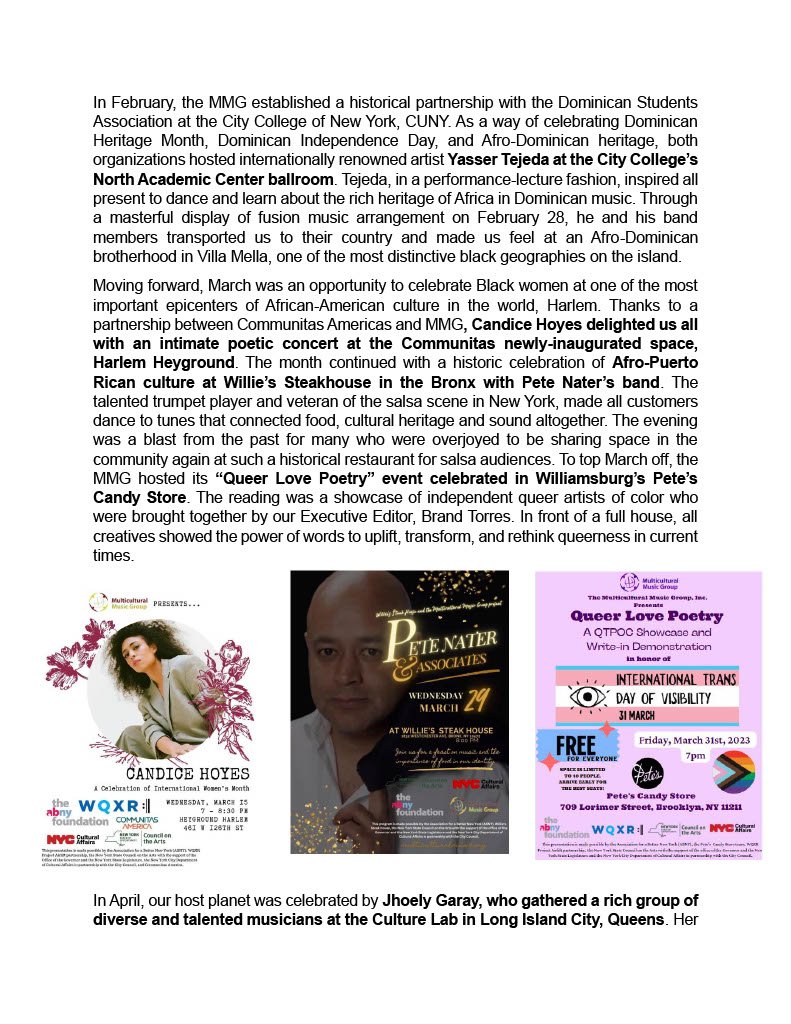
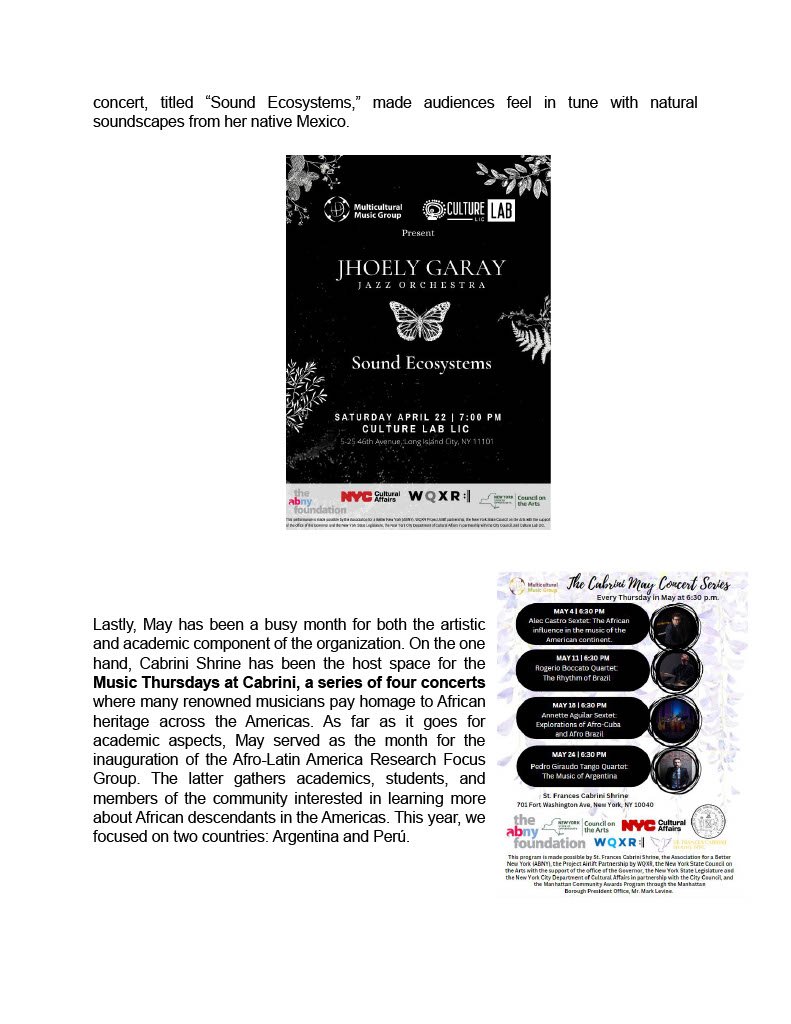


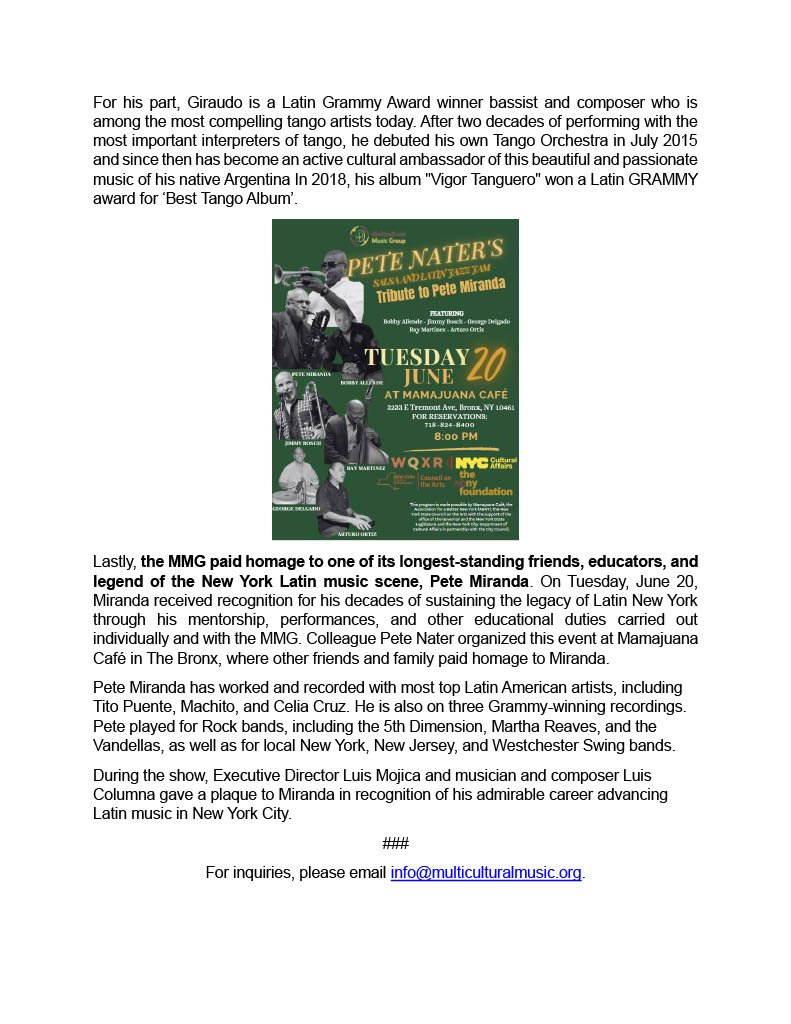
May 2023 Newsletter








April 2023 Newsletter



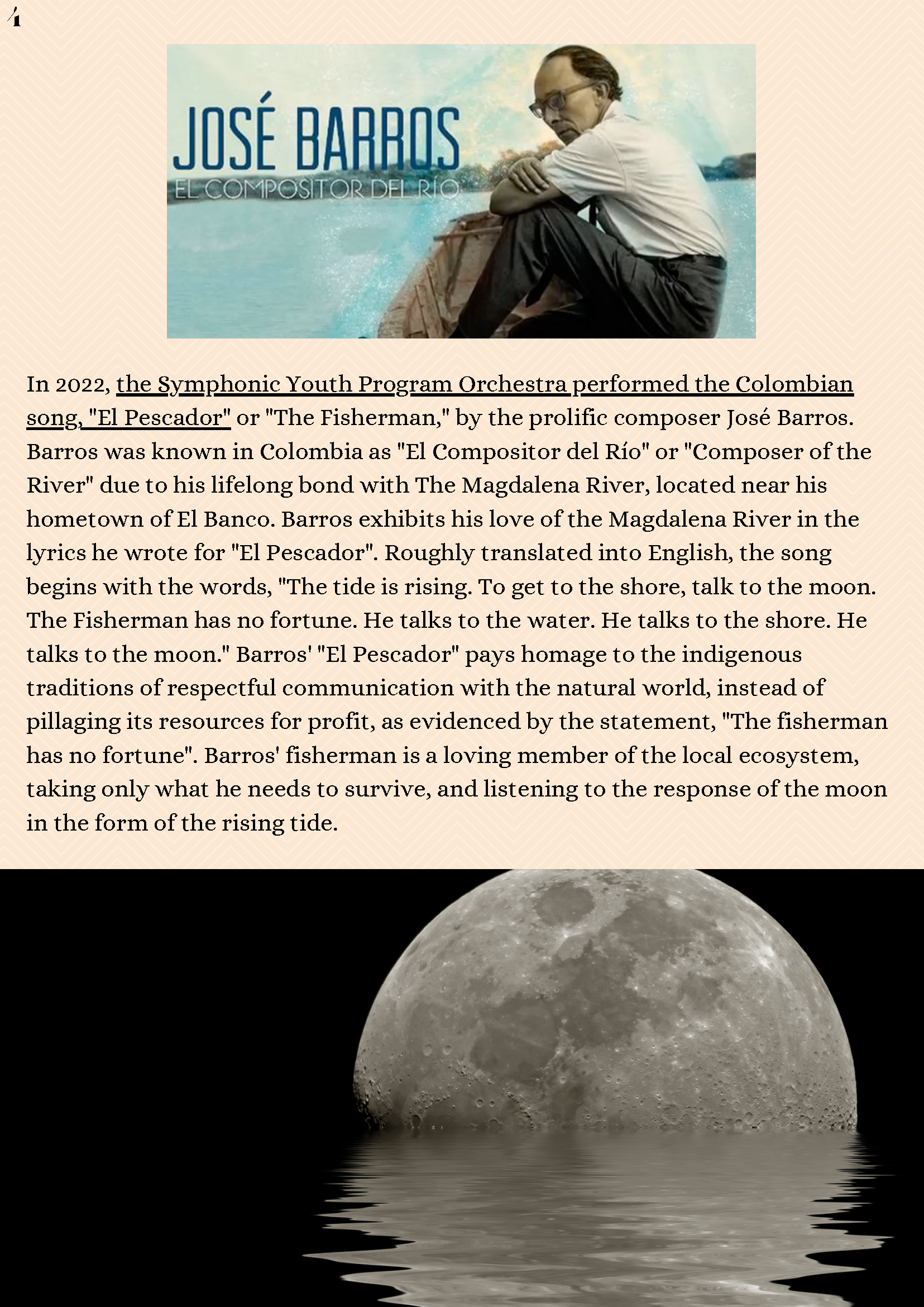
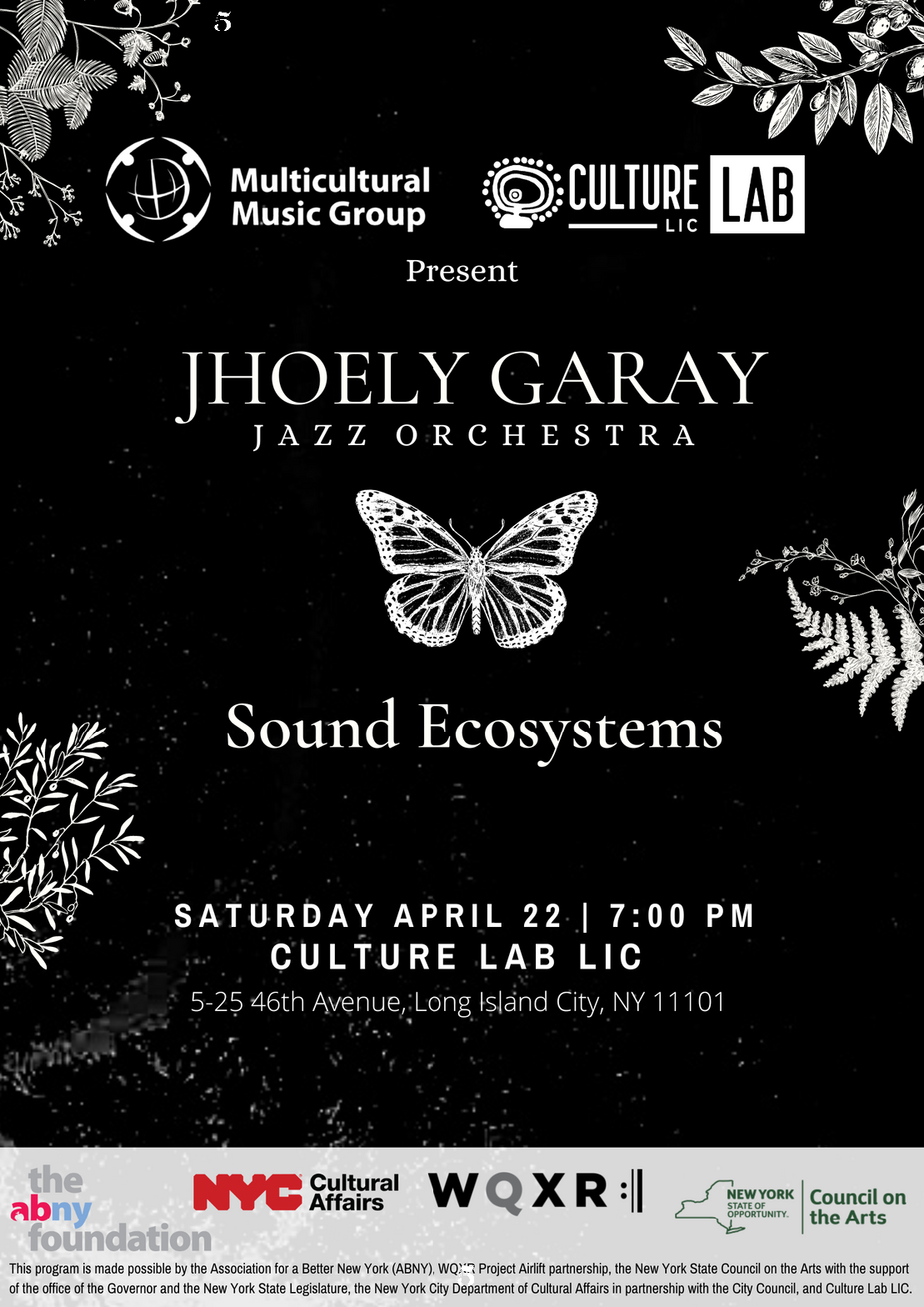

March 2023 Newsletter






February 2023 Newsletter

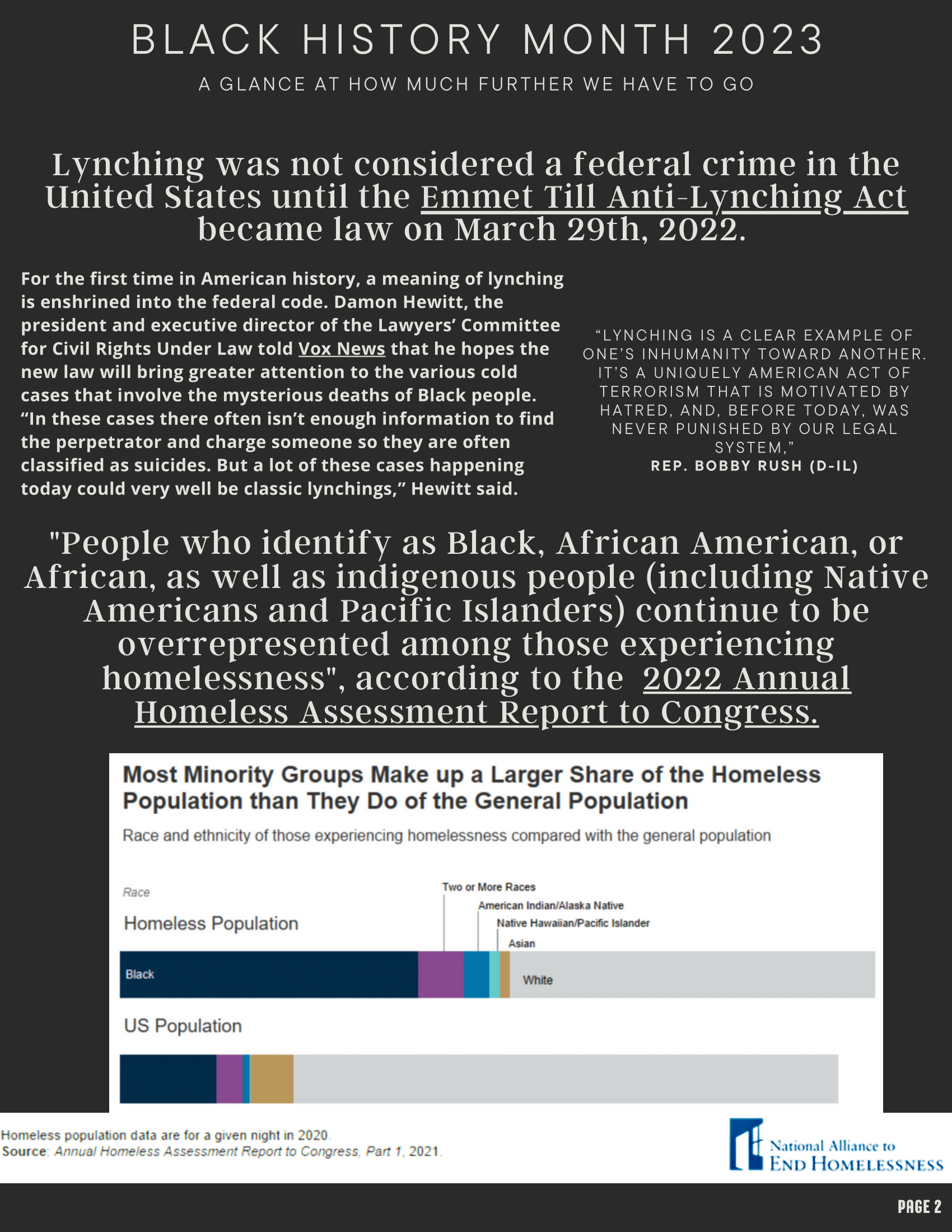


January 2023 Newsletter





December 2022 Newsletter


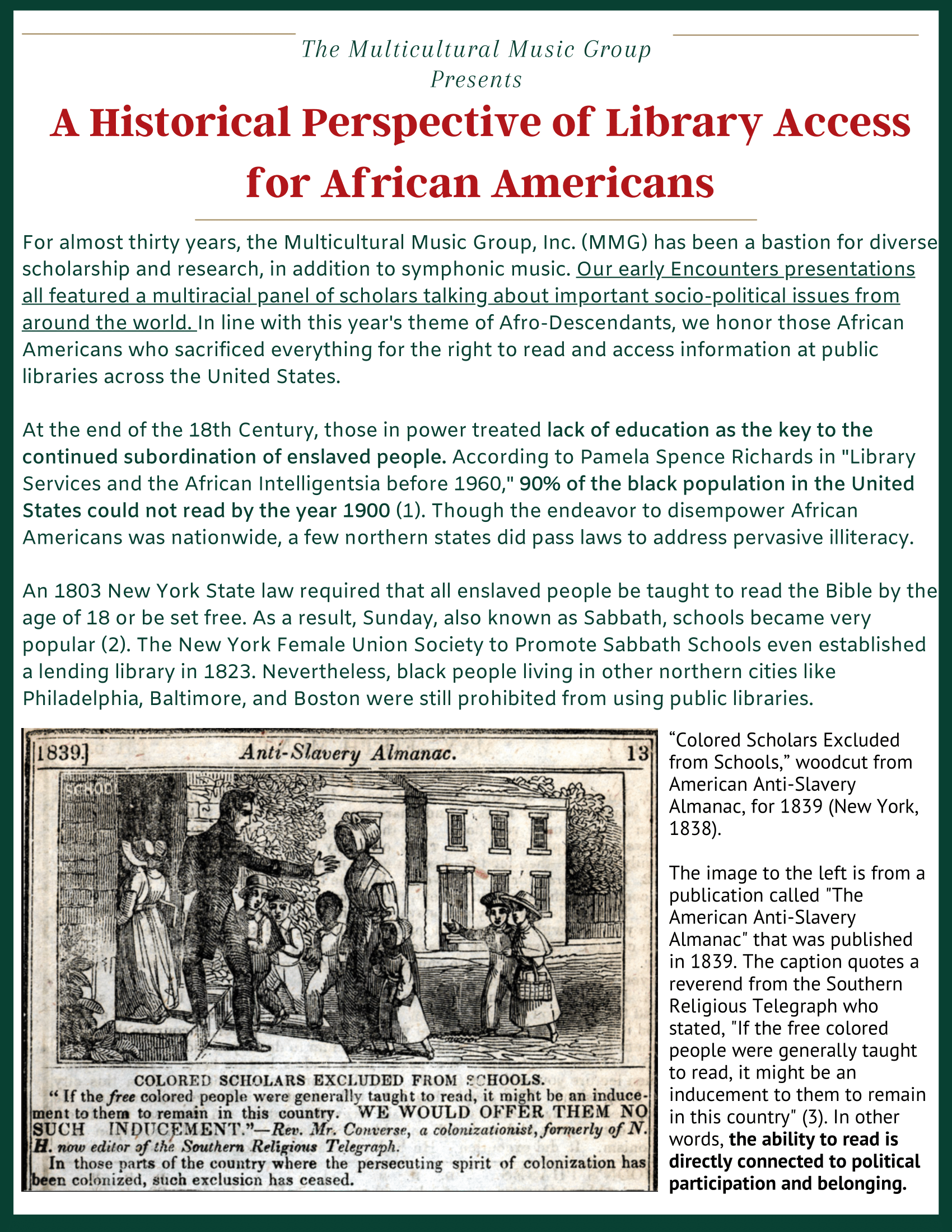

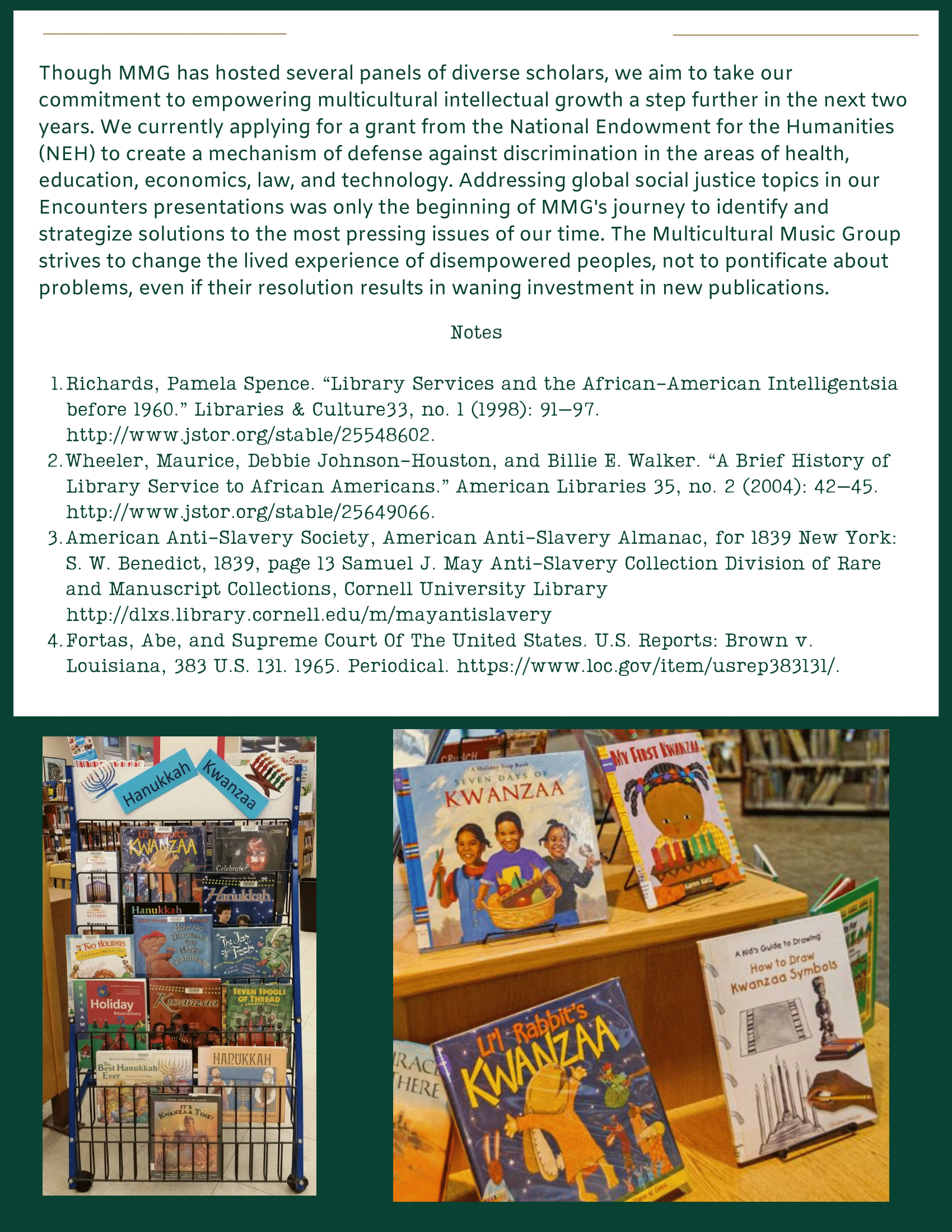
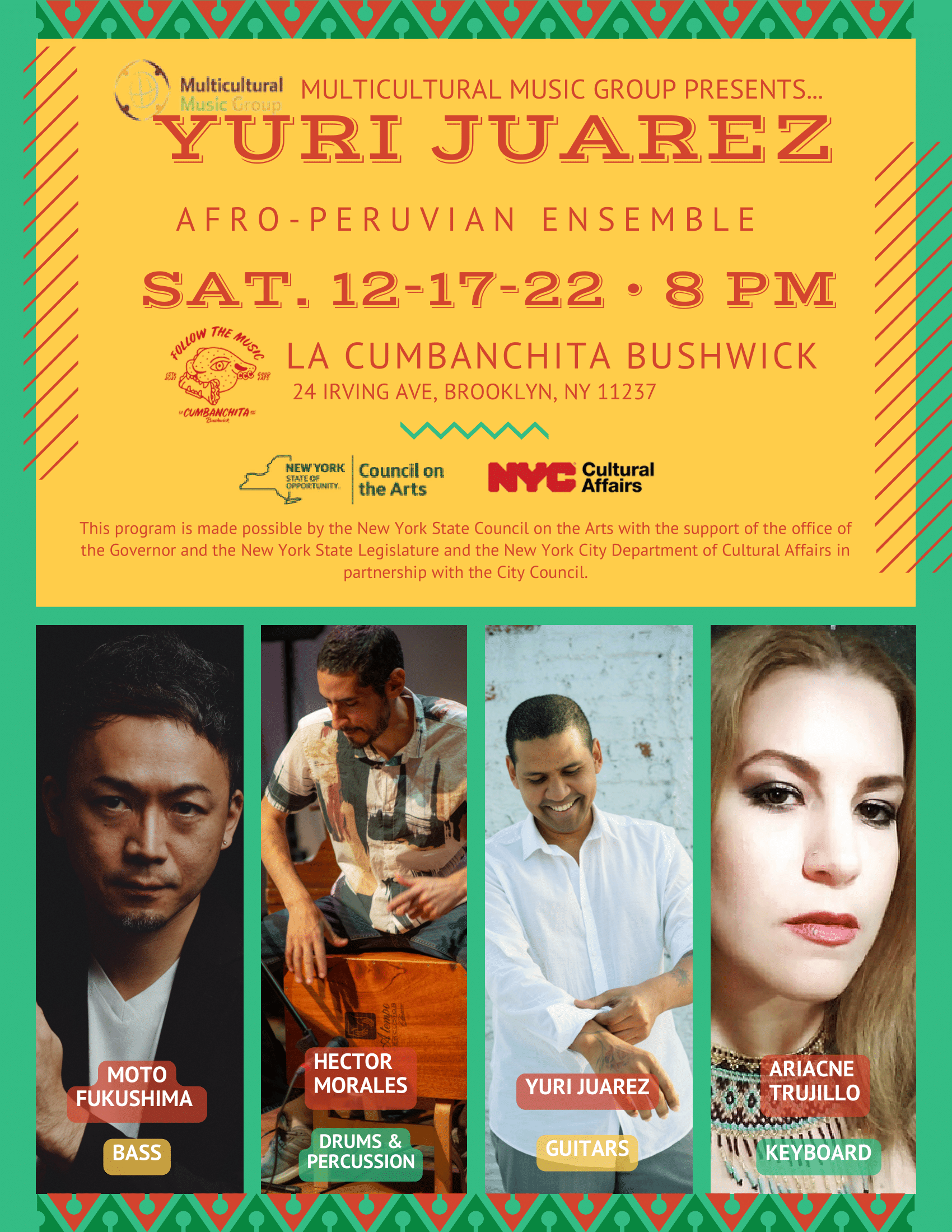
November 2022 Newsletter






October 2022 Newsletter

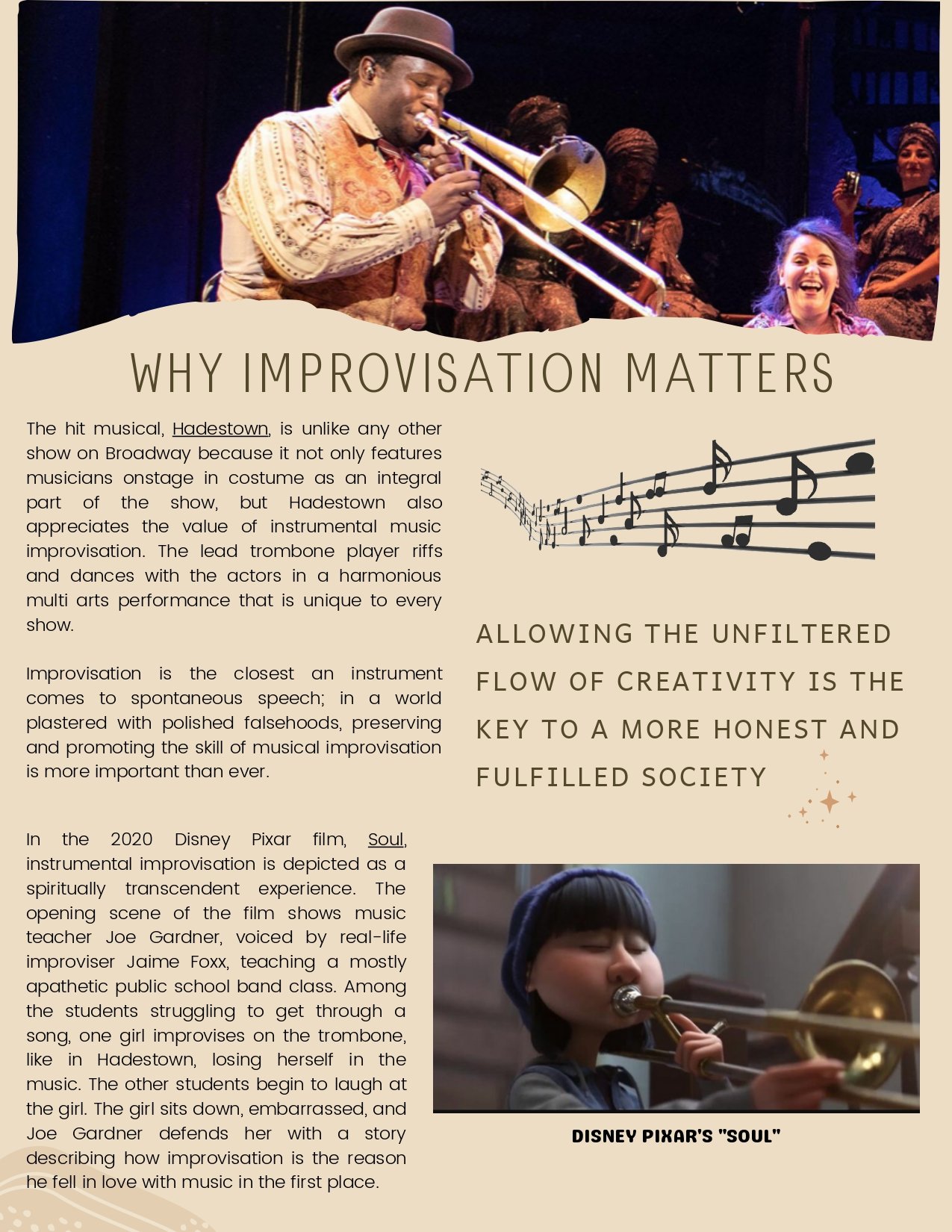
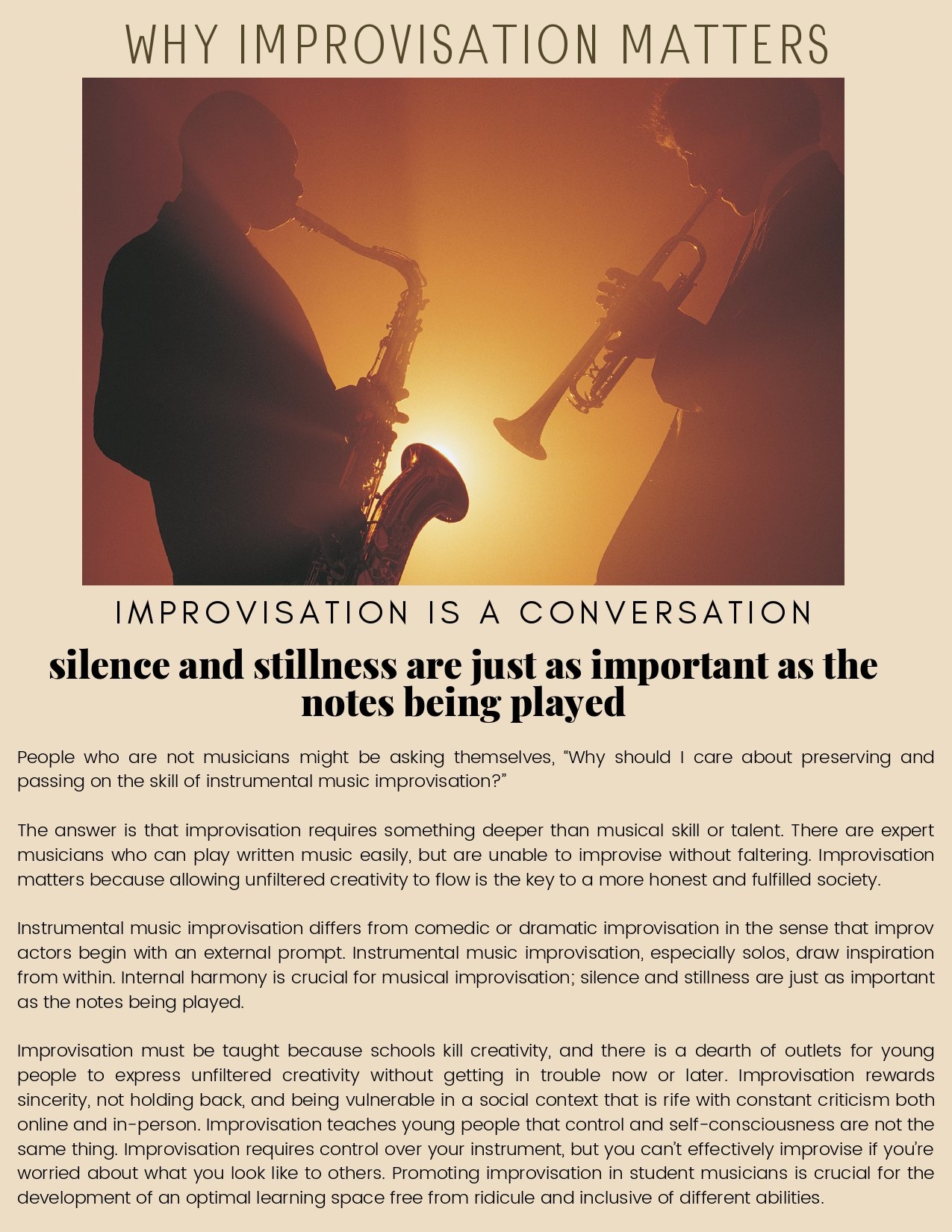

The Multicultural Music Group Launches its Year-Round Programming with Día de Muertos and Son Jarocho
The Multicultural Music Group celebrated its first event of the year on October 28, 2022. Día de Muertos feat. Julia del Palacio took place at the Saint Frances Cabrini Shrine in Washington Heights. The performance allowed attendees to honor and remember the loved ones who have passed away.
According to the Mexican Museum, Día de Muertos originates “in the rituals practiced by the indigenous peoples of the Americas. Its precedents date to more than 3,000 years ago when the Olmecs and subsequent Toltecs, Mixtecs, Zapotecs, Maya, and Aztecs honored death.”
In present times, families build altars to welcome in the loved ones who have departed. They include flowers, candles, photos, papel picado, and many other offerings for the dead.
This year, Dr. Julia del Palacio helped shape the remembrance through a performance of son jarocho, a Mexican, Creole, and African musical fusion from Mexico’s southern coastal plain area of Veracruz. Del Palacio learned the traditional son jarocho zapateado under the instruction of renowned dancers in Veracruz and Mexico City. Since 2005, she has been performing professionally in the United States and training in other dance disciplines.
To watch the entire performance, please go here.
